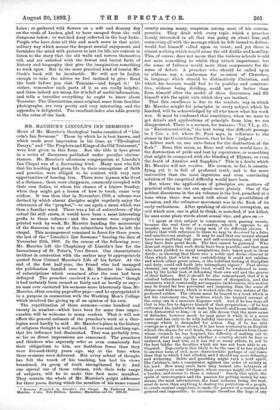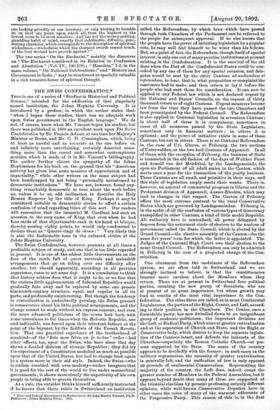MR. MAURICE'S LINCOLN'S INN SERMONS.* MosT of Mr. Maurice's theological
books consisted of "Lin- coln's Inn Sermons." Those by which he is best known, and which made most impression in his time, as "Theological Essays," and "The Prophets and Kings of the Old Testament," were first given in this form. But the title is here given to a series of discourses published under peculiar circum- stances. Mr. Maurice's afternoon congregation at Lincoln's Inn Chapel was of a fluctuating kind. Many men who felt that his teaching had given life to their conceptions of faith and practice, were obliged to be content with very rare opportunities of hearing him. There were laymen who lived at a distance ; there were clergymen, commonly occupied with their own duties, to whom the chance of a leisure Sunday, when they might get a lesson of how to teach, came very seldom. It was thus that in November, 1856, a scheme was devised by which absent disciples might regularly enjoy the utterances of the "prophet,"—to use again a name which was then a familiar word. There was a list of subscribers—if the actual list still exists, it would have been a most interesting prefix to these volumes—and the sermons were regularly printed week by week, Mr. Maurice handing the manuscript of the discourse to one of the subscribers before he left the chapel. This arrangement remained in force for three years, the last of the "Lincoln's Inn Sermons" bearing the date of November 20th, 1859. In the course of the following year, Mr. Maurice left the Chaplaincy of Lincoln's Inn for the Incumbency of SL Peter's, Vere Street. One characteristic incident in connection with the matter may be appropriately quoted from Colonel Maurice's Life of his father. At the end of the first half-year, the friend who had managed the publication handed over to Mr. Maurice the balance of subscriptions which remained after the cost had been defrayed. The preacher received it as a "donation," though it had certainly been earned as fairly and as hardly as any— no man ever corrected his sermons more laboriously than Mr. Maurice, of ten erasing page after page—and he appropriated it to a purpose in connection with the Working Men's College which involved the giving up of an opinion of his own.
The republication of these sermons—some hundred and twenty in number—which have been for some time unpro- curable, will be welcome to many readers. That it will not affect the general estimate of the preacher's work as a theo- logian need hardly be said. Mr. Maurice's place in the history of religious thought is well marked. It was said, not long ago, that his influence had diminished. That was probably true, so far as direct impressions are concerned. The preachers and thinkers who expressly refer or even consciously feel their obligations to him, are doubtless fewer than they were five-and-thirty years ago, say at the time when these sermons were delivered. But every school of thought has felt the touch of his teaching, has had its views broadened, its grasp of truth strengthened by it. And one special use of these volumes, with their wide range of subjects, will be to make this fact more manifest. They contain the whole of Air. Maurice's pulpit addresses for three years, during which the mention of his name roused • Sermons Preached in Lincoln's Inn Chapel. By Frederick Denison Maurice. 6 vole. New Edition. London : Macmillan and Co. 189142. enmity among many, suspicion among most of his contem- poraries. They dealt with every topic which a preacher keenly interested in all that was going on about him, and connecting all with the message which he felt bound to deliver, would feel himself called upon to treat; and yet there is almost nothing which would rouse the old dislike and hostility. This, of course, does not mean that the various schools would not miss something to which they attach importance, but the sense of fullness would more than compensate for the sense of defect. A preacher who should be called upon to address, say, a conference for re-union of Churches, in languav which should be distinctively Christian, and which his hearers would feel to be positive and construc- tive, without being dividing, could not do better than form himself after the model of these discourses, and fill himself with the spirit with which they are instinct.
That this excellence is due to the resolute way in which Mr. Maurice sought for principles in every subject which he handled, will be acknowledged by all who know what his work was. It must be confessed that sometimes, when we want to get details and applications of principle from him, we are disappointed. There is a sermon, for instance (Vol. VI., p. 41), on "Excommunication," the text being that difficult passage in 1 Cor. v. 3-6, where St. Paul says, in reference to the sinner in the Corinthian Church, that he has "judged to deliver such an one unto Satan for the destruction of the flesh." Does this mean, as Beza and others would have it, the destruction of pride and lust by repentance, or something that might be compared with the blinding of Elymas, or even the death of Ananias and Sapphire? This is a doubt which Mr. Maurice will not resolve. His sermon, so far, is unsatis- fying, yet it is full of profound truth, and is far more instructive than the most ingenious and even convincing solution of the exegetical difficulty would have been.
But where the applications of principles are matters of practical ethics no one can speak more plainly. One of the noblest discourses in the six volumes is the last, preached at a time when there was much talk about the possibilities of invasion, and the volunteer movement was in the flush of its early enthusiasm. After speaking of electoral corruption, an evil which now, one is glad to think, is scotched, if not killed, he uses some plain words about sexual vice, and goes on :—
"I speak of this subject in connection with passing events, because the real force of a country, which it opposes to an invader, must lie in the young men of its different classes. I believe that with reference to them we may be deceived by a false and mischievous analogy. It may be said that our armies abroad have been anything but pure and self-restraining, and yet that they have done great deeds. The fact cannot be gainsaid. Who does not rejoice that such deeds have been possible, and that men who have yielded to many temptations, have taken part in those deeds ; so showing that there was a noble and divine element in them which that which was contradicting it could not subdue, and which either great crises, or the habitual feeling of discipline and duty, could call forth into triumphant rigour? That divine element, one may confidently trust, would be awakened in num- bers by the holier task of defending their own soil and the graves of their fathers. But it should be also remembered, that if it is crushed beforehand by the recklessness of dissipation, and the meanness which continually accompanies recklessness, this motive may be found far less prevalent and inspiring than the sense of shame and dishonour, which is worked into the very nature of the professed soldier. The citizen must be braced to a work which is not his customary one, by motives which the trained servant of the camp can in a measure dispense with. And if he has done all that in him lies to deprive himself of that preparation,—if he has cultivated the habits which make his hearth and home indifferent, even distasteful to him,—it is an idle dream that the mere name of defender, however much he may prize it while it is a mere name and has only to do with holiday exercises, will give him the courage which is demanded for action. Nay, if he has that courage as a gift from above, if it has been nurtured in an English school, the shame for evil deeds, the sense of alienation from those whose counsels he has despised, the difficulty of making out to himself what it can signify whether a country should be free or enslaved, may lead him, as it has led so many others, to sell to the best bidder the faculties which sin has not been able to ex- tinguish. Especially is this likely to be the case if he has yielded to another form of evil, more characteristic perhaps of our times than that to which I last alluded, and I should say more debasing and withering. Debts and gambling might turn a bold spirit, like Catiline's, into a conspirator against the order of society in his land. How many more have they turned into betrayers of their country to some foreigner, whose success might rid them of a burden, and secure to them a reward ! Surely this spirit, the spirit of extravagance and the passion for getting money by any means, the most adventurous, the least toilsome being the best, must do more than anything to destroy the patriotism of a people, to create mutual suspicions, to make the pursuit of a common and general end impossible; to encourage therefore the hope of any
one looking greedily at our territory, or only wishing to humble us on that one point upon which all, from the highest to the lowest, seem to be most sensitive. And has not the money-getting, gambling habit of mind, exactly that indefinable, diffusive, pene- trating character, which corresponds to the description of spiritual wickedness,—wickedness which the sharpest swords cannot touch, or the best devised laws provide against P"
The two series "On the Eucharist," notably the discourse on "The Eucharist considered in its Relation to Confession and Absolution" (Vol. IV., 140-158) ; "Homilies," 1-2, in the same volume," On National Celebrations ;" and "History and Government in India ;" may be mentioned as specially valuable in a rich treasure-house of spiritual thought.



































 Previous page
Previous page